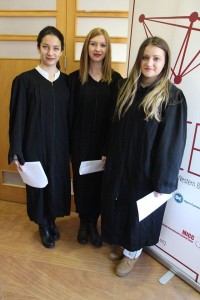Model International Criminal Court Western Balkans (MICC WeB) is a unique project currently being implemented in former Yugoslavia. A partnership between three organizations – Open Communication (Serbia), Humanity in Action (Bosnia-Herzegovina), and the Croatian Education and Development Network for the Evolution of Communication HERMES (Croatia) – this project has thus far brought together high school students and teachers from 30 cities from these three countries. Thanks to the grant provided by the German foundation Schueler Helfen Leben, this 18-months-long program consists of six high school sessions and three university sessions, all held throughout 2014 and 2015.
MICC WeB is an adapted simulation of war crimes trials, where students take on the role of prosecutors, defense attorneys, judges, the press. In an intense six day program, they cover topics of human rights dilemmas, history and identity de/construction, they interview contemporary witnesses from the wars in former Yugoslavia. The education culminates in the actual trial simulation, where well known war crimes trials are re-enacted, bringing Friedrich Flick (tried in Nuremberg after World War II), Simon Bikindi (tried in International Criminal Tribunal for Rwanda) and Dražen Erdemović (tried in the International Criminal Tribunal for the former Yugoslavia) to trial.
This project is a unique initiative in the region that suffered conflict two decades ago, where the subject of war crimes is a particularly sensitive one not widely discussed in public, let alone in schools. MICC WeB empowers young people to engage with these difficult topics through an intensive program comprised of simulated court cases, trainings, workshops and critical discussions. The importance of this project is visible at different levels. Not only does it bring together youth from Bosnia and Herzegovina, Croatia and Serbia, but it also provides them with the opportunity to learn about the difficult history of the region that is very personal, experienced by their own families through different, often divisive, perspectives. By tackling taboos prevalent in the region marked by recent turbulent past, MICC WeB seeks to open up the space for communication in order to digest the difficult history – and not let it hold hostage any longer the region’s young people’s present and future.
Five high-school sessions already took place in Mostar, Zagreb, Novi Sad, Belgrade and Sarajevo and in January/February 2015, the last high-school session will take place in Osijek. The three sessions for university students will take place in Sarajevo (February 2015), Zagreb and Belgrade (April). The project partner organizations are currently fundraising for continuation of the project, to respond to the high demand from schools.
You can find more information about the project by visiting the project website (www.miccweb.org) or by contacting majanenadovic@miccweb.org.
This article was originally written by Kerim Somun & Maja Nenadović.
Tags: Conflict, Curriculum, Policy, Reform, Students, Teaching


